
For the first time in 31 years, the Japanese team got a medal in the Thomas Cup 2010. Shoji Sato, who was a captain of Japan’s bronze medal-winning team in Kuala Lumpur this past May, reveals his feelings in an exclusive interview with Badzine.
By Miyuki Komiya, Badzine Correspondent in Japan. Photos: M. Komiya and Badmintonphoto
BADZINE(BZI): You refused to join in Japan National Team as a singles player in 2009. And then, you played doubles on the national team in 2010. Why did you agree to play singles again in this year’s Thomas Cup?
Shoji SATO(Shoji): When I joined the national team, the category was very important, because I could only train with the team in the category I had chosen. The Thomas Cup is a special event for badminton players so I decided to accept the offer for the Japan team even though it wasn’t the category in which I had been training on a daily basis.
 In the Japanese national team, there are 4 doubles pairs and 4 singles players. Unfortunately, one of our singles had a sore elbow. Other one singles is a newcomer who doesn’t have much experience participating in overseas tournaments yet. So maybe this is why the staff asked me to play singles.
In the Japanese national team, there are 4 doubles pairs and 4 singles players. Unfortunately, one of our singles had a sore elbow. Other one singles is a newcomer who doesn’t have much experience participating in overseas tournaments yet. So maybe this is why the staff asked me to play singles.
People said that I have had good performances only in the Thomas Cup. That’s probably because I have had some big wins from great players like Peter Gade and Taufik. I didn’t beat them in other individual tournaments like the Super series or the Olympics. The pressure makes many of them play differently, not like they usually do. So I was thinking I had a chance to get a big win even if my opponent’s ranking was much higher than mine. I had a positive feeling about playing well in the Thomas Cup.
BZI: Did you have different feeling between this time and before?
Shoji: This is my 5th Thomas Cup. Previously, I was just a player so I just did my best in training and events. But this time, I was the team captain. I thought a lot about what I should do as a captain. For more than half of our team, it was the first time ever participating in this event so I tried to make all players feel good by keeping good communication amongst us. I sometimes gave some advice to the staff, sometimes to the players. Little by little, it all clicked in and we had good team spirit and a sense of responsibility was growing in my mind.
 BZI: You played as the 3rd singles this time. Your whole team was then relying on your performance. Did you have more pressure?
BZI: You played as the 3rd singles this time. Your whole team was then relying on your performance. Did you have more pressure?
Shoji: I was the first Singles before, so those times, I just did my best and thought “Winning was great! Losing was sad.” Because it wasn’t the decisive match. There were 4 more matches after mine. But this time, the whole team result depended on my result. Of course I had a little more pressure than before. But my sense of responsibility was greater than the pressure.
BZI: Did you expect to reach the semi-final?
Shoji: Actually, NO. Our coach Mr. Park said that our aim was to reach the semi-final. It isn’t negative thinking. 5 countries – China, Korea, Denmark, Indonesia and Malaysia – are really strong and it was very hard to beat them so I knew the target was going to be tough to achieve. Just saying it is easy, but it’s difficult to do it. But I also know how much useful it is to set oneself a target. Once we did, we trained hard in order to achieve it. I trained hard before the Asian qualification round but Coach Park told me that I hadn’t focused enough in training. I couldn’t understand what he meant at that time.
 In the match against India, I played 3rd singles. At 20-18, I had almost won but my opponent caught me and I lost the game. Until then, I believed I could win that kind of close game because I had beaten Taufik and Peter in the closed game in Thomas Cup. But when I lost the game, I was sad as I realized I hadn’t played my best. Of course I did play my best, but I thought I could play better than I did. Maybe Coach Park worried about my attitude as I didn’t focus. I realized that and I decided to train even more. I really trained as hard as possible – I’ve always tried to train hard [he says, smiling].
In the match against India, I played 3rd singles. At 20-18, I had almost won but my opponent caught me and I lost the game. Until then, I believed I could win that kind of close game because I had beaten Taufik and Peter in the closed game in Thomas Cup. But when I lost the game, I was sad as I realized I hadn’t played my best. Of course I did play my best, but I thought I could play better than I did. Maybe Coach Park worried about my attitude as I didn’t focus. I realized that and I decided to train even more. I really trained as hard as possible – I’ve always tried to train hard [he says, smiling].
But this time, I tried to keep up my concentration and move more after I had almost given up in training. Usually I can’t move after I gave up. But I can move in the same situation when I keep up my concentration. I think that winning comes from an attitude like this.
BZI: How was the final stage in Malaysia?
Shoji: The Japanese team was in the same round as Nigeria and Malaysia. The Nigerian team reached Malaysia 3 hours before the match against Malaysia so Malaysia didn’t play with them but we played with them and could feel the wind, shuttle conditions, and atmosphere in the venue before our match against Malaysia. I felt the Malaysians looked nervous during the match against us. Maybe the Malaysian fans expected them to beat Japan because they have the world #1 singles and doubles players.
 BZI: Did you expect Japan to win against Malaysia?
BZI: Did you expect Japan to win against Malaysia?
Shoji: Actually, I had mixed feelings. Sho (Sasaki) was great in this Thomas Cup. When he played against Wong Choong Hann, he kept focused on the match. But Choong Hann looked a little nervous on court. We expected Sho to win that match.
But actually, I had 2 feelings at the same time. One was that I wanted to play and win. The other was that I didn’t want to play against Hafiz Hashim. We had played each other 6 times before and I had won only once, in the Yonex All England. Some of my losses were quite bad as I couldn’t do anything on the court. I realized that Hafiz is stronger so I was a bit afraid. But I needed to overcome the feeling when Hayakawa/Kazuno won. I reset my mind and tried concentrating only on the match.
I believed that I had a chance to win if I could lead from a big margin in the first part of the 1st game. In fact I did that and won the game. But he got the 2nd and I felt that I might lose. In the 1st game, I was on the court against wind so I could use strong shot without fearing that the shuttles would go out. However, in the 2nd game, I needed to control the shuttle along with the tailwind because I didn’t want to give away any easy points. So before the final game, I tried to get as many as points possible when I was on the side against the wind.  If I could do that, I expected Hafiz to make mistakes.
If I could do that, I expected Hafiz to make mistakes.
However, it wasn’t as easy as I had expected. We switched courts at 11-10. All my teammates were cheering so hard that I really wanted to win. I reset my mind again and decided to play in a good mood without any negative feeling. Anyway, I imagined I could win. If I didn’t have a strong will for win, the atmosphere in the venue would have made it difficult as Malaysian badminton fans were really cheering loudly.
After changing courts, Coach Park advised me: “Don’t smash with too much power. Hafiz returned as you move a lot, and then, you made mistakes. You can receive his smash. So you should keep using more clears and slices.”
I focused on trying to keep the rallies going, as he had advised. Honestly, I was afraid to play high lobs because he is tall. Negative thinking came to my mind and I threw the feeling away. I kept playing with just a little bit of fear and then Hafiz hit many smashes. I was able to defend well and keep going so I then had more and more confidence. Maybe Hafiz must have felt pressure because Malaysia really wanted to win as the home team. I got a 19-15 lead. It reminded me of the match against India. I tried to keep focussed this time.
When I won, I was just happy. Honestly, I didn’t remember what I thought at the moment. Anyway, I was relieved as I had accomplished my task.
BZI: How was your feeling when the QF fixtures came out?
Shoji: All rankings were fixed after our match with Malaysia. We knew in the bus that our next opponents were Germany. It was lucky for us because we had lost to Korea and India in the qualification round and we also didn’t want to play Malaysia again because we weren’t confident that we could win again. So Germany was better for us. Maybe Germany thought that they were lucky too, to play against Japan because the others were strong countries: China, Indonesia and Denmark.
I felt that we had a chance to reach the semi-final. Maybe other members also felt like that. Some of them seemed to be already too relaxed. But some experienced members didn’t think that we could win easily because we had only beaten them 3-2 at the last Thomas Cup. I wanted our players to focus on each match with a positive image. But I didn’t want them to think that we could win easily.
 BZI: As a result, the Japanese team was able to reach the SF?
BZI: As a result, the Japanese team was able to reach the SF?
Shoji: I was surprised that we managed to reach the semi-final. I felt that previous Japanese teams were stronger than the current team. The previous team had many veteran members who had had good results like semi-final appreances at the World Championships, but the team hadn’t reached the semi-final stage. It was the first Thomas Cup for almost all players in our team. I didn’t reach final stage in my first Thomas Cup 2002. And I didn’t expect that I could get a medal on my 5th Thomas Cup!
BZI: Japan used scratch doubles pairs in the semi-finals. Was that better than normal?
Shoji: Actually I am not sure which is better. Our coaches also seemed to be thinking about a lot of things while they decided on the doubles pairs. Coach Park told our doubles players about the possibility of their partner change before that so the players weren’t that surprised. Hayakawa/Kazuno had good performances in this event so they might not have chance to play as the 2nd doubles because Indonesia’s singles and doubles were really strong. So our staff seemed to want to try them at 1st doubles.
BZI: Sho SASAKI beat Simon Santoso in the semi-finals. Did you give him some advice before the match?
Shoji: I didn’t say anything to Sho because I wanted him to play at his pace. We were together for a long time in school and the national team. So we understand each other.
Sho was MVP for the Japan team in this Thomas Cup. He needed to play behind our 2 losses. But he played calmly and consistently. His mental toughness was very tough. His win showed us we could beat higher ranked players this time as well.
BZI: How was your Thomas Cup performance overall ?
Shoji: I really did my best so I don’t regret anything. I was tired even long after the event was finished. When we had a match, I needed to prepare to play well. But sometimes I didn’t need to play in the match even though I wanted to. I tried to maintain my concentration almost every day. It was also tough for me though not to play.
Anyway, I appreciate the help of many people: the staff, the other players and the badminton fans. Thanks to them, their efforts or cheers, we were able to get the bronze medal. I am especially thankful to Kazushi Yamada because he didn’t play any matches but yet he helped our warm up every day during this event. I hope that this good result will give confidence to Japanese players to get more good results in the future!
![SHOJI SATO : “This time, I was the captain…” For the first time in 31 years, the Japanese team got a medal in the Thomas Cup 2010. Shoji Sato, who was a captain of Japan’s bronze medal-winning team in […]](http://www.badzine.net/wp-content/uploads/sato2.jpg)

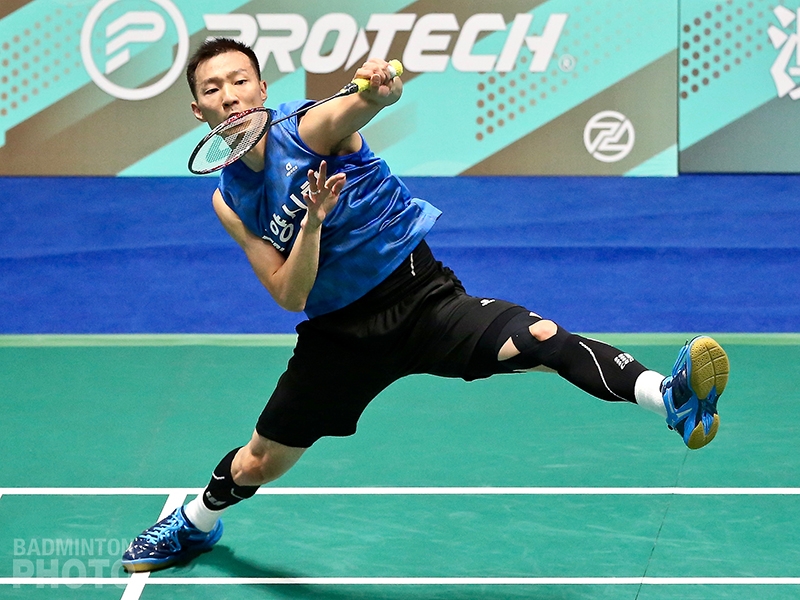
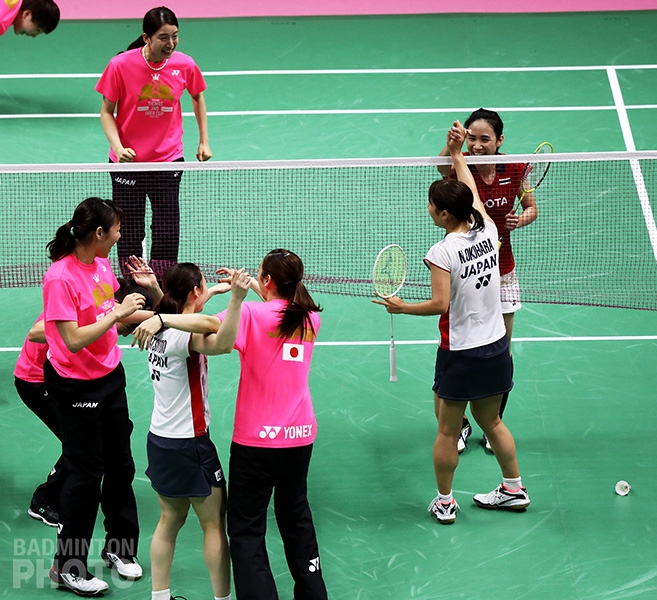
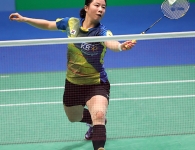
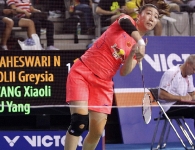
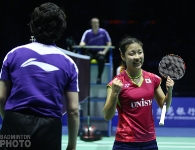
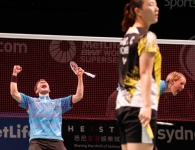
Leave a Reply